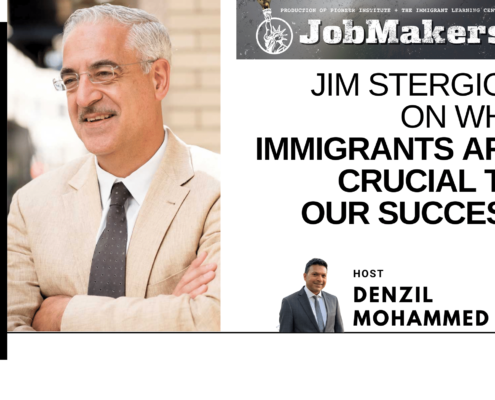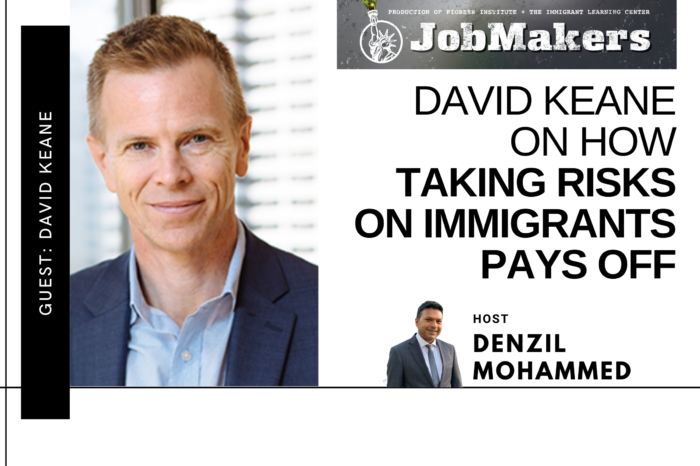David Keane On How Taking Risks On Immigrants Pays Off
/in Economic Opportunity, Featured, JobMakers /by Editorial StaffThis week on JobMakers, host Denzil Mohammed talks with David Keane, immigrant from Australia and founder of Bigtincan, an artificial-intelligence-powered sales enablement platform for leading companies worldwide. David believes that what makes the U.S. special is its culture both of welcoming immigrants and being willing to try new things, to take risks. In the United States, visas and exchange programs have allowed for the movement of ideas, skills and knowledge into the country. For him, that movement of people is a risk worth taking. A diversity of thought and background can bring about incredible new ideas, products and services, like his industry-leading company, not to mention create thousands of jobs as he’s done over the years. He wonders, though, about how the next generation of entrepreneurs will construct movement and sharing in a world of heightened globalization and connectedness, as you’ll discover in this week’s JobMakers.
Guest:
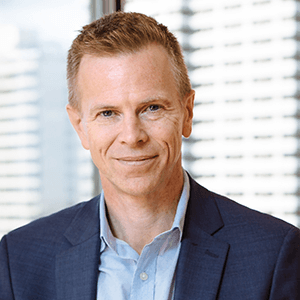 David Keane is Co-Founder & CEO of Bigtincan, a global leader in sales enablement automation that is helping the world’s leading brands facilitate the buying experience. David started in the networking and communications market with Utah and California-based Novell running Asian marketing for Boston-based Wellfleet Communications, Inc. then grew the business for California based Xylan Corp. in Australia and New Zealand. Subsequently, David founded Veritel Wireless Pty Ltd which grew within three years to be one of the largest providers of wireless internet in Australia. David was a pioneer in the mobile applications sector starting in 2008 with the release of the first iPhone SDK and oversaw the development, promotion and expansion of heavily downloaded apps including BuzzMe and AdFree.
David Keane is Co-Founder & CEO of Bigtincan, a global leader in sales enablement automation that is helping the world’s leading brands facilitate the buying experience. David started in the networking and communications market with Utah and California-based Novell running Asian marketing for Boston-based Wellfleet Communications, Inc. then grew the business for California based Xylan Corp. in Australia and New Zealand. Subsequently, David founded Veritel Wireless Pty Ltd which grew within three years to be one of the largest providers of wireless internet in Australia. David was a pioneer in the mobile applications sector starting in 2008 with the release of the first iPhone SDK and oversaw the development, promotion and expansion of heavily downloaded apps including BuzzMe and AdFree.
Get new episodes of JobMakers in your inbox!
Read a Transcript of This Episode
Please excuse typos.
Denzil Mohammed:
I’m Denzil Mohammed, and this is Jobmakers.
Denzil Mohammed:
Last week, we spoke with Swedish thinker, Johan Norberg about openness, the free move of people and ideas, and the progress that results in the United States, visas and exchange programs have allowed further movement of ideas, skills, and knowledge into the country. The result. Well, for one thing, immigrants make up more than a third of America’s Nobel Prize Laureate for David Keane, immigrant from Australia and founder of Bigtincan, an artificial intelligence powered sales enablement platform for leading companies worldwide that is headquartered in Boston and deploys more than 400 people. That movement of people is a risk worth. Taking a diversity of thought and background can bring about incredible new ideas, products, and services like his industry leading company, not to mention, create thousands of jobs as he’s done over the years. David believes that what makes the us special is its culture, both of welcoming immigrants and being willing to try new things, to take risks. He wonders though about how the next generation of entrepreneurs will construct movement and sharing in a world of high globalization and connectedness. As you’ll discover in this week’s JobMakers,
Denzil Mohammed:
David Keane, founder of Big Tin Can welcome to JobMakers. Thank you so much for having me great to be here. You’re the first a we’ve interviewed. So congratulations on that.
David Keane:
Thank you. Now I’ll try and control this outrageous Australian accent I have. So the listeners can make sense of what we’re saying, but no, it’s just wonderful to be here and really excited to talk about our story and share more with you. So in a nutshell, describe for the general public is this and what it does Bigtincan is an enterprise software company. And what that means is we make software that is used by enterprise organizations. That’s normally sort of larger companies that are faced with a really significant challenge in their business today. Now the reality of business for many enterprises is that because of this digital revolution we’ve had and internet and social media, when they think about their customers, they’re faced with the reality that those customers are better prepared and more informed than ever before, before they meet someone on their customer facing team.
David Keane:
And whether that’s a sales person or a customer success person, or a customer support person, that human being, whether they actually engage with a customer or a prospect, is finding that very often that customer has done more research and actually sometimes knows more than their own staff member that’s supposed to help them. And this is a significant change in how the economy works. I’d like the, the videos out there to think about it in their own world. How many times have you gone into a, you know, a cell phone shop or, you know, to buy a new retail product or to buy a financial services offering, or even some kind of industrial equipment where you have no more about what you need than the person who’s supposed to be helping you or selling to you now that’s caused a change in our economy. And we believe that those human beings who are working on the customer facing side of enterprise organizations need new ways to get better prepared themselves and more informed. So we build the software that enterprise organizations, and we now have 97 of the Fortune 500 deploying our technology. They use that to make sure that every one of their human beings that works with their customers is themselves better prepared and more informed to actually deliver a better service and better experience to that buyer. And so our software is used to really try and make that connection more powerful.
Denzil Mohammed:
So even in the two thousands, you were thinking about this, you know, in a time prior to a lot of the technology and resources that the general public has. Why did you think it was so important to focus on this particular area?
David Keane:
Well, I, my background actually, when I, it goes back, it goes back to the 1990s slash maybe some of our, our listeners here remember the 1990s. But, you know, there was a time when, when you were in a customer, you had all these support services to actually help you to be better prepared and, and more informed for your own engagements with customers as we went through the 2000s much of that disappeared. And certainly the GFC caused many of those support roles to go away forever. Now we believed that some of that work could be done. Computers can be done by smart software, and we have the technology now to build smart software that can actually really help folks to work better and smarter.
David Keane:
I know it seem, may seem like a long bow to draw, but if you think about today’s world of self-driving cars, how they can, you know, help you to perform safer, you know, get from point a to point B more, a few, we believe that software can help human beings and a customer facing role to do the same versus London versus Tasmania. I mean, how that’s a of DS, right? Well, we’ve, it is in fact for many organizations, it is a strategic advantage to be in a global market. And for big 10 can, you know, we realize that the need someone has in Tokyo or in London or in Tasmania is actually very similar and we can solve those problems with smart data science models and smart software that understand the nuances of those local environments. And just by the way, we’re in more than 40 languages, not just in multiple locations in more than 40 languages.
David Keane:
And we know that with software, we can start to address those needs and we can make someone in Tokyo. Who’s part of an organization based out of, out of London, feel connected to that company to have access, you know, to the right content and the right materials. So they can actually really make a difference. But yeah, I think it’s the reality for many organizations is there’s a global opportunity. Now we have to also act local while we think global, but, oh geez. If we can start take advantage of the power of technology, we can make the world more effective.
Denzil Mohammed:
That’s fascinating. I mean, you talk about this globalized world you’re yourself of you’re from Australia. This podcast is about immigrant entre entrepreneurs in the us. How has that perspective of being an immigrant shift, the, the vision for your business?
David Keane:
Look, I think it’s always interesting when you look at the world and I’ve been very fortunate to have had a chance to visit a bunch of places and meet some incredible people all over the world. You know, one thing for me is that I I’m always reminding myself of how similar the world is, even in our differences and that we have an opportunity to be able to make the world better by embracing those differences, but also helping folks to achieve the similar goals we have in our everyday lives. You know, I think being an immigrant is a huge opportunity and I I’m really appreciative of the, the welcome I’ve had here in the United States and the, the human beings that have been so helpful in helping big team Canada, helping myself and my family to feel incredibly welcome here.
David Keane:
But I also know that we are very fortunate coming from Australia. And I know that that experience is not the same for everybody. Australia has a particular relationship with America and, you know, I think we’ve been very fortunate to be so welcomed and I’m sure it’s not the same for everybody. So I just really, you know, appreciate that. And I think though, you know, when you, when you really break it all down, it, it doesn’t matter where you’re from. It’s it’s are you able to bring about, are you able to think in, in, in new and interesting ways about how you can make the world better and how you could understand the real world problems that people have and the more you see of the world, I think the better you can be doing. So, yeah, I mean, I think as, as a message to other immigrants coming into America and wherever it is, you choose to go around the world.
David Keane:
I think it’s a unique opportunity. And whilst there will be challenges, if you make the most of it, I think the opportunity for growth is really strong.
Denzil Mohammed:
You mentioned some really fascinating things there about, you know, the universality of this globalized world, all the things that we have in common. And yet they are very marked differences, language, culture backgrounds, economic statuses, mm-hmm <affirmative> that we, that we also need to recognize and you, you mentioned that, you know, the relationship of Australia to the us, your move to the us was a very deliberate,uand thoughtful move you, their moved here strategically. How have you seen as a business owner, diversity, diversity of thought, diversity of background, Vivi immigration to the us affecting innovation and entrepreneurship. Do you think it’s something that’s needed to innovate?
David Keane:
Oh, I, I think it is needed as a very interesting word, but I think it is incredibly helpful to have a broad and diverse background as a human being.
David Keane:
It, it doesn’t matter where you’re from, if you have a diverse and broad understanding and you have a broad set of skills, I think that adds tremendous tremendously to the innovation opportunity. You know, one of the things that helped, I think, in, in that I saw coming from a small market like Australia, where you, you couldn’t be as deep in any individual area, you had to be more broad because small markets. So, so you didn’t have the same degree of specialization you have in the bigger markets traditionally in the us, because of the scale of, of the market. You see many humans who just go deep, deep, deep, a particular topic, so they can be the super expert at that area. And you combine that with multiple people who sort of pass on the Baton as they go between areas of expertise, smaller markets, less mature markets, you need to have a more diverse set of skills.
David Keane:
And I think that is definitely helpful. If you understand a broader range of things, I think you can bring innovation in new ways with that. But, but I do believe that, you know, this idea that you can bring your skills and your approach to the world is really what our future is all about. And again, I’m looking forward to seeing what the next generation of entrepreneurs can do, whether they’re, you know, where wherever in the world, they’re starting out and wherever they see their future, you know, that opportunity to be able to bring their experience and their backgrounds to big markets, I think is what’s gonna change our world even more. Can you gimme an example perhaps of how that diversity of thought, you know, brought something to fruition?
David Keane:
Oh, in, in, in our world, one of the advantages we had actually starting back in Australia. So this company started in Australia and we had our, our first customers in Australia. And we were able to go to those first customers and bring them what you now see in our product. This, like we talked about it before of this combination of, you know, skills, development, content, delivery, and insights into customer engagements. You know, we were doing all of those things. When we first started the company, we weren’t just doing one of them deep. We were doing all of them. And if we hadn’t have been doing all of them, we wouldn’t have been able to translate that in the same way to scale that we’re doing now, we just wouldn’t have worked, but we were forced to because the market we were in was not ready to support that degree of specialization.
David Keane:
And so that diverse thinking, diverse, forced diverse view was incredibly important to help us to build where we are today. And if we look at some of our human beings in the global big team can team, we’re so fortunate to have people that have also had that diverse background, cultural experience, technology, you know, social, those things together can make a difference.
Denzil Mohammed:
There’s this theme of almost capitalizing on the globalization that has happened and seeing all the benefits that can be can accrue from it. But, you know, we are living in a time where nationalism is, is at the forefront of a lot of people’s minds. They want to close in. And even during the pandemic where we connected over Zoom, which by the way, founded by immigrant from China, indeed. How, how do you respond to, to the wave of nationalism given that globalization has empowered your business so much.
David Keane:
But I still believe that most human beings want opportunity.
David Keane:
They wanna be able to take, build futures for their families, and they wanna be able to create new and exciting ideas. That’s what human beings exist for. And most of that is the same. And our team here has really embraced that and the idea that our humans can move around the world and be part of that experience, you know, just, we have had human beings that have moved from the United States to Australia, where the companies moved them there, because that was an opportunity for their am and their families to have a personal experience that was strong. We’ve moved human beings from Australia to, to north America. You know, this idea that we can move people around and have them welcomed. And part of creating that future, I think is essential for everybody. So, so look at the end of the day, you know, I, I do feel that what souls, and again, some of this is naive.
David Keane:
I know it is, but I can’t help this, this, this idea that when you bring people together and you see each other and you realize that people want the same thing that helps people to be more connected in a world where people are connected is a better world than a world where people are siloed and separate, but, you know, look it is, it’s also wonderful to be able to have these dialogues. And I do applaud you for the way you’re doing this and the questions you’re asking. Cause some of these are not easy questions. They’re really not, they’re confronting questions, but I really applaud you for asking them. I think we have to be able to say to the world, some of these things, we don’t have the answer for, but we’ve gotta at least understand that they’re there. And then we’ll hopefully make incrementally better decisions as we move forward.
Denzil Mohammed:
It’s quite fascinating. You talk about it like this, the bringing together of people generates ideas because in the very last podcast interview that, that I did with Johan Norberg from Sweden, who’s from the Cato Institute one of his books, he says, when allowed freedom, they don’t create chaos, but progress. And so I find that very, very fascinating, cuz that’s exactly what you’re talking about here. The bringing together people and ideas brings up, you know, things to fruition.
David Keane:
It probably brings up bad ideas as well. I think the reality is we have to be honest with that too. Bringing people together can sometimes bring up things that are not optimal that are not advancing us in the way we wanna be advanced. I don’t think it’s always that there is a guaranteed outcome, but that’s a risk worth taking because if we, as a society, believe that fundamentally everybody is good, but certainly I, I do.
David Keane:
And I think that’s something that people have a different view on, but you know, if you, if you believe that and you feel that human beings will on overall make more positive decisions than negative ones, then bringing people together through immigration and through travel is important. We will see together. And we don’t know, we are talking here in the end of January of 2022, you know, we’ll see in January, 2023, what has happened with the world has travel changed. Do we not travel as much as we used to? Is, is that an impact? And what does that mean to some of the things that, you know, we just talked about? Does it mean that those same fresh ideas happen in different ways? Does it mean we encourage more bad ideas? I mean, stressful time to be around on our planet, but a very interesting time.
David Keane:
And I just feel that every human must be part of doing what they can to help make, to help us to move in that positive direction. And I think technology is gonna give us better opportunities. We’re gonna have access to more data and more support and more knowledge than any human has ever had in the history of our planet. And I hope we make the best use of that.
Denzil Mohammed:
You’ve been affected by immigration policy I’ve been affected by immigration policy. And given what you’re talking about right now in this interview how do you see, or, or where, where do you see immigration policy in the us? You know, what would be to most benefit for every all for all Americans?
David Keane:
Well, this is another interesting question because for all Americans is a very, very interesting question that has to be answered, I think by politician, but, but at the end of the day, all I can share with you is certainly now before the pandemic, and again, this is a, a personal experience based in Australia.
David Keane:
We, we used the immigration programs of the Australian government extensively, where we found opportunities to bring folks in that could really make a difference to our business and our customers. It was a major focus now, of course, Australia, as many of the listeners here will, will realize had a very strict COVID policy. And that was completely stopped. We could do nothing. We could not continue that program, but, but look at the end of the day, I think policies that recognize the benefits that diversity can add to the world are important. Programs that support innovation in terms of making it possible to bring skills to bear. We, we don’t know. And it’s, again, it’s a question for a different podcast and a different speaker, but I think at the end of the day, the decisions that the countries make about, you know, how do you combine skilled versus unskilled?
David Keane:
These are, these are questions that are really interesting questions for our society, but, but I do believe that, yeah, with a world that is more remote and with looking here back in a year where we have less travel anyway, where we have less immigration, anyway – these are really interesting things that I think, again, people that are involved in these things you are doing, it’s really important what you’re doing. Cause we want everyone to understand this and help to create the best possible future. And so my views simply is yes, we need policies that support the needs of business. We need policies that make it appropriate, and we need policies as well that encourage certainly here in the us domestic skill development and the production of, the support of human beings who choose stem type careers to feel they’re supported in those careers.
David Keane:
I think that’s something that also we have to address. And these thing are complimentary in many ways.
Denzil Mohammed:
It it’s about the market. It’s about innovation. It’s about ideas. It’s about the economy. It’s, it’s not necessarily a political issue, right? It’s, it’s a human issue.
David Keane:
The, the only thing driving innovation is people it’s, it’s people, it’s a people business. That’s all it is. The company like BigTinCan. We have some great technology and we love our technology. We have a bunch of patents. That’s all great. But the end of the day, that’s nothing. It’s all about the people that work here. And those people need to be able to work together and exchange ideas together in person and remotely, they need to do it across cultural and political boundaries, and they need to be encouraged to realize that they can do it for themselves and their families. And that’s what we need for our future.
Denzil Mohammed:
So you’ve been living in the us for eight years now. UBoston has welcomed you. It has helped you thrive. It has helped you succeed. It has helped you,uspread all over the world. Uwhat are your thoughts on United States as a home for inherently entrepreneurial immigrants like yourself?
David Keane:
Oh, well, I can only give you my personal degree. We’ve been very welcomed. We’ve given tremendous opportunity. We could never have built the company that big 10 is today without the move to the us. We’ve all heard the story of the better mouse trap. I think a lot of the world culturally, when they see the better mouse trap, they’re skeptical that it’s really a better mouse trap. And I think the are many cultures that are like that. I think Australia is one of those where, you know, overall people are less inclined to try the better mouse trap.
David Keane:
They’re more inclined to stick with the mouse trap. They know, I think what does make the United States unique in my view today is the ability to embrace the better mouse trap. If the mouse trap is better, I’m gonna use it. I don’t care about who made it. I don’t care about where it came from. I don’t care about all this stuff. All I care about is just to catch mice better than the old one I was using before. And I think that is one of the things that is incredible about the United States of America. And I feel it is a core part of the reason why United States has been able to deliver so much innovation decade after decade, is that cultural attitude to trying something new.
Denzil Mohammed:
Willing to try out that better mouse trap. I couldn’t think of a better analogy. David Keane, thank you so much for joining us on Jobmakers. Thank you so much for having me, everyone. Thanks for joining us for today’s fascinating conversation and how immigration enriches America’s entrepreneurship and innovation got comments, questions, or guests that we should talk to email Denzil that’s D E N Z I L at job makerspodcast.org. And please leave us a review. I’m Denzil Mohammed. Join us next Thursday at noon for another episode of Jobmakers.
Recent Episodes:
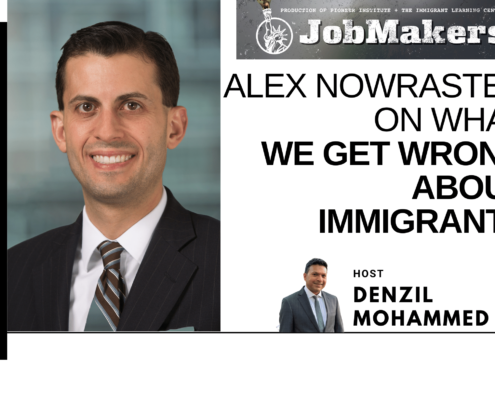
Alex Nowrasteh on What We Get Wrong About Immigrants
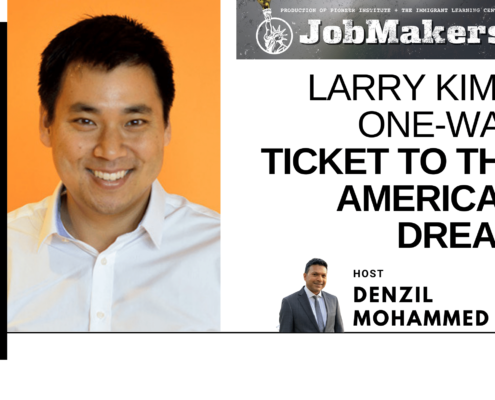
Larry Kim’s One-Way Ticket to the American Dream
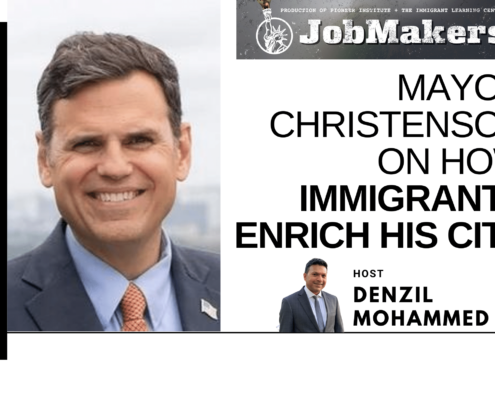
Mayor Christenson on How Immigrants Enrich His City
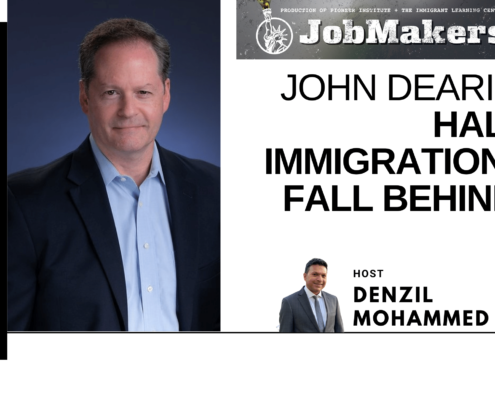
John Dearie: Halt Immigration? Fall Behind
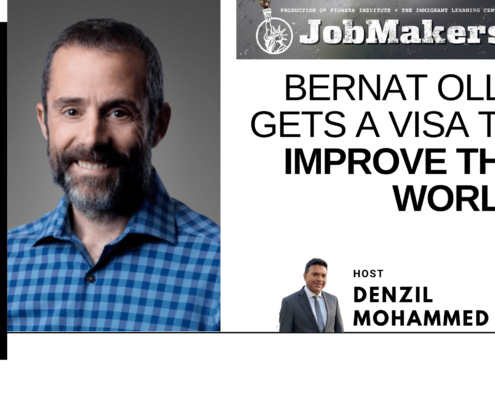
Bernat Olle Gets a Visa to Improve the World
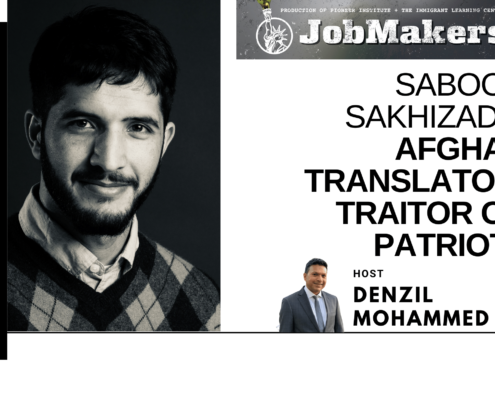
Saboor Sakhizada, Afghan Translator: Traitor or Patriot?
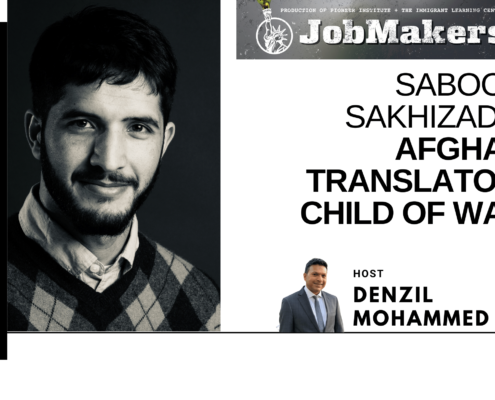
Saboor Sakhizada: Afghan Translator, Child of War
